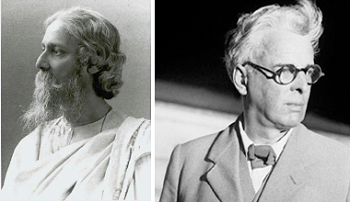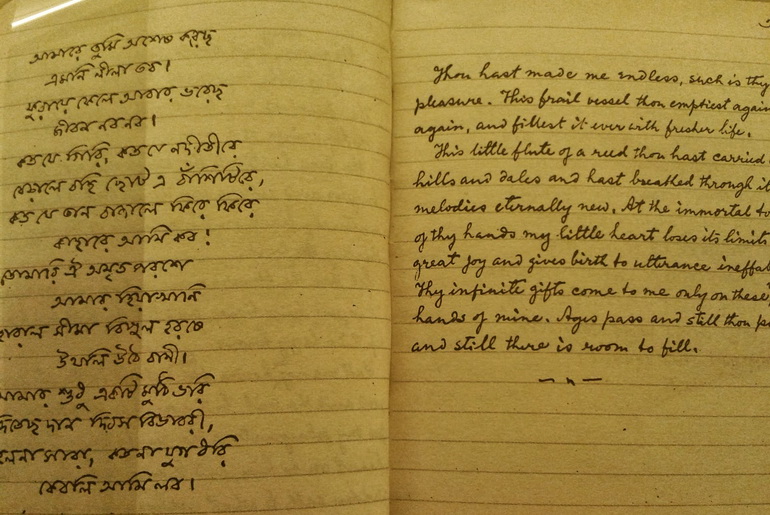It is a known fact that great poets cannot explain why they are writing certain poetry.
When Coleridge died, he left near about forty thousand poems incomplete. His whole life his friends were saying, ”These poems are so beautiful, why don’t you complete them? And it is not much work! Some poem is missing only one line or two lines or three lines, it is almost complete. Just compose one line more, and it will be part of the eternal literature of humanity.”
But Coleridge always said, ”I have never written anything. Whenever I am possessed, something pours from me. Sometimes the poem is complete; sometimes, before the poem is complete the possession has disappeared. Coleridge is there. I have tried; I can deceive the whole world, but I cannot deceive myself. Just to compose one line more and make the poem complete… nobody is going to find out unless a man reads who has the same poetic experience as me; only he will find that all these lines have come from the beyond, but one line – the last line – is written by somebody else. And I don’t want to deceive myself, or the future humanity.”
It happened… a very significant incident. One of the Indian poets, Rabindranath Tagore, translated one of his small books of poems, GITANJALI, “Offering of Songs.” He was awarded the Nobel prize for that small book.
In India it was available for at least fifteen years. But unless a book meets the international standards of language and gains international appreciation, it is difficult for it to get a Nobel prize. Rabindranath had all the best education possible in the world, but still a mother tongue is a mother tongue. He had written all his poems in Bengali, but a few friends suggested that GITANJALI has such a grandeur that if it was translated into English there was every possibility of it getting a Nobel prize. But who should translate it except Rabindranath himself? Who could be a better translator?
Rabindranath himself was a little worried, because he translated it and to translate poetry is always a very difficult affair. To translate prose is simple; to translate poetry is immensely difficult, because prose is of the marketplace and poetry is something of the world of love, of the world of beauty, of the world of moon and stars. It is a delicate affair.
And every language has its own nuances which are almost untranslatable. Although the poet himself translated his own poetry, he was doubtful about the translation. So he showed it to one of the Christian missionaries, a very famous man of those days, C.F. Andrews — a very literate, cultured, sophisticated man. A great scholar and very influential, a world-famous figure — to go through the translations because Andrews could also understand Bengali. He was living in Bengal as a missionary; he was working amongst Bengalis and had learned their language. So he was the right person to go through the translation and to look at the original. – Rabindranath had shown his poems, and asked, ”Do you see any grammatical, linguistic mistakes in them?”
C. F. Andrews was a great scholar, but he was not a poet. He had looked through the poems, and only at four places he said, ”These words are grammatically wrong. Everything is absolutely correct as far as grammar and language are concerned, but these four words have to be changed.”
He suggested four other words of the same meaning, and it became more grammatical, more correct as far as language is concerned. Andrews suggested four changes. So, Rabindranath simply accepted his advice and changed those four places.
In England Rabindranath had friends among all the English poets, so he went to London where he was a guest of one of the great poets of those days, William Butler Yeats, an Irish poet, dramatist, prose writer and one of the foremost figures of 20th-century literature. And Yeats called a meeting of only English poets to listen to the recitation of Rabindranath’s GITANJALI. He was convinced that the book was so rare and so unique that it could be proposed for a Nobel prize, but it would be good to have the opinion of many Nobel prize winning poets.

Rabindranath & W.B.Yeats
So near about twenty or twenty-five poets gathered in Yeats’ house to listen to Rabindranath’s recitation. They were all immensely impressed. The beauty of it was something absolutely new to the Western world and unanimously they wanted to make an appeal to the Nobel prize committee that the book should be honored by a Nobel prize. But Yeats himself had a little reservation.
He said, “Everything is perfectly right, but in four places it seems that somebody who is not a poet has made some changes.” Rabindranath could not believe it.!
He asked, “Where are those four places?”
Yeats pointed out the four places. These were exactly the four words that C.F. Andrews had suggested!
“Where did you get them? Because I have every certainty in my being that they are not your words. No poet can use those words in the places where they have been used. A linguist, yes; a man who wants to be perfect in grammar and language will use them. But a poet has a certain freedom; he has a poetic license to go a little off the track with grammar because poetry is a higher value than prose. For prose, grammar is okay, but for poetry, grammar can be a disturbance.”
Rabindranath said, “What is wrong?”
He said, “There is nothing wrong, they are grammatically correct. But poetically…whoever suggested them is a man who knows his grammar but does not know poetry. They look as if somebody else has interfered; they prevent the flow of poetic beauty. Rather than being a help, they are hindrances. He is a man of the mind but not a man of the heart. The flow is obstructed, as if a river had come across a rock. I would suggest that you change these words.”
Rabindranath could not believe it, but he said, “You are right, these are not my words; these words are from C.F. Andrews. I will tell you the words that I originally used.”
And when he replaced his words in, Yeats was immensely happy. Yeats said, “They are perfectly right although grammatically wrong. But grammar is not important. When it is a question of poetry, grammar is not important. You change it back, use your own words.”
He said, “Now everything is okay. Those four rocks are removed from the river-like flow. Your words are not grammatical but they are poetic, and they are coming from your very heart.”
A poet cannot be corrected by a grammarian, by a linguist, by a scholar – and another poet of the same depth can immediately see.
Grammar is a game of the mind and poetry is not part of the mind; mind is essentially prose, poetry belongs to the heart.
Grammatically wrong, but poetically right, GITANJALI was presented to the Nobel prize committee and was accepted unanimously for the prize.
I have always been thinking that there are ways of the mind, there are ways of the heart; they need not be supportive of each other. And if it happens that the mind is not in agreement with the heart, then the mind is wrong. Its agreement or disagreement does not matter. What matters is that your heart feels at ease, peaceful, silent, harmonious, at home.
We are trained for the mind, so our mind is very articulate. And nobody takes any care of the heart. In fact, it is pushed aside by everybody because it is of no use in the marketplace, it is no use in the world of ambitions, no use in politics, no use in business.
But with me, the situation is just the opposite — the mind is of no use. The heart….Everything happens, just your heart has to be ready to receive it.
Everything comes, but if your heart is closed…. The secret laws of life are such that the doors of your heart will not even be knocked on.
Existence knows how to wait; it can wait for eternity.
It all depends on you.
Everything is ready to happen any moment. Just open all your doors, all your windows, so that existence can pour into you from every side. There is no other god than existence, and there is no other paradise than your very being.
When existence pours into your being, paradise has entered into you — or you have entered into paradise, just different ways of saying the same thing.
But remember: nothing is expected of you.
All the religions have been telling you for centuries that you have to do this, you have to do that. That you have to be a torturer of yourself, you have to renounce pleasures, you have to fight with your body, you have to renounce the world.
The Buddhist scriptures have thirty-three thousand principles that a sannyasin should follow. It is almost impossible to remember them — following them is out of the question.
I don’t have a single principle for you to follow; just a simple understanding that it is your life — enjoy it, allow it to sing a song in you, allow it to become a dance in you. You have nothing else to do but simply to be available.
And flowers are going to shower on you.
Osho: Beyond Enlightenment Chapter #9 Chapter title: The Master is a mirror Q 4 (excerpts)
Osho: Bodhidharma: The Greatest Zen Master Chapter #4: Buddhas don’t practice nonsense (exceprts)
Osho: The Messiah, Vol 2: CHAPTER 21. BECOME AGAIN AN INNOCENT CHILD (excerpts)
Osho, The Sword and the Lotus – Talks in the Himalayas, Ch 15, Q 1 (excerpt)
शेर दर-अस्ल हैं वही ‘हसरत’
सुनते ही दिल में जो उतर जाएँ ……………..हसरत मोहानी
sher dar-asl haiñ vahī ‘hasrat’
sunte hī dil meñ jo utar jaa.eñ………….. Hasrat Mohani
The true couplet, Hasrat, are those
Who, upon hearing, settle deep within the heart.
Poets are blessed with a unique gift to capture life’s fleeting moments, just as the poet in Main Pal Do Pal Ka Shair Hoon does. Great poets often can’t explain why they write, their inspiration comes from a place beyond understanding, making their words timeless and deeply resonant. This beautiful song is from the film: “Kabhi Kabhi” (1976) Singer: Mukesh Music: Khayyam Lyrics: Sahir Ludhianvi

